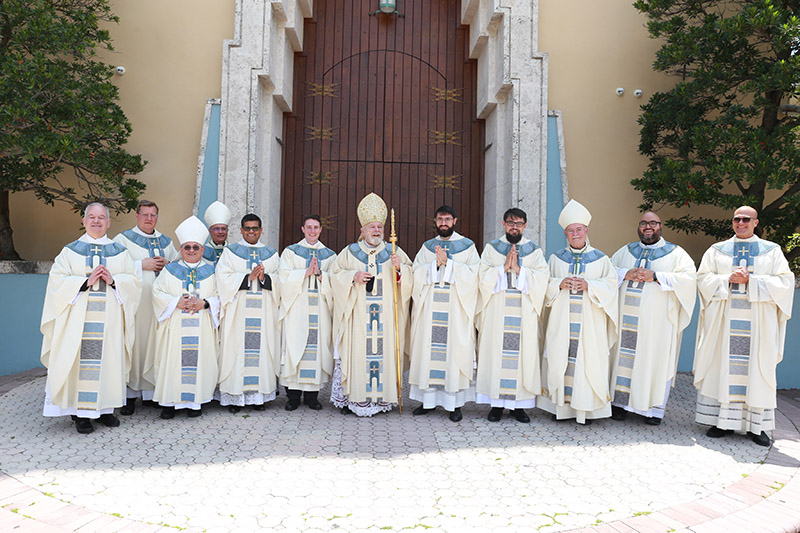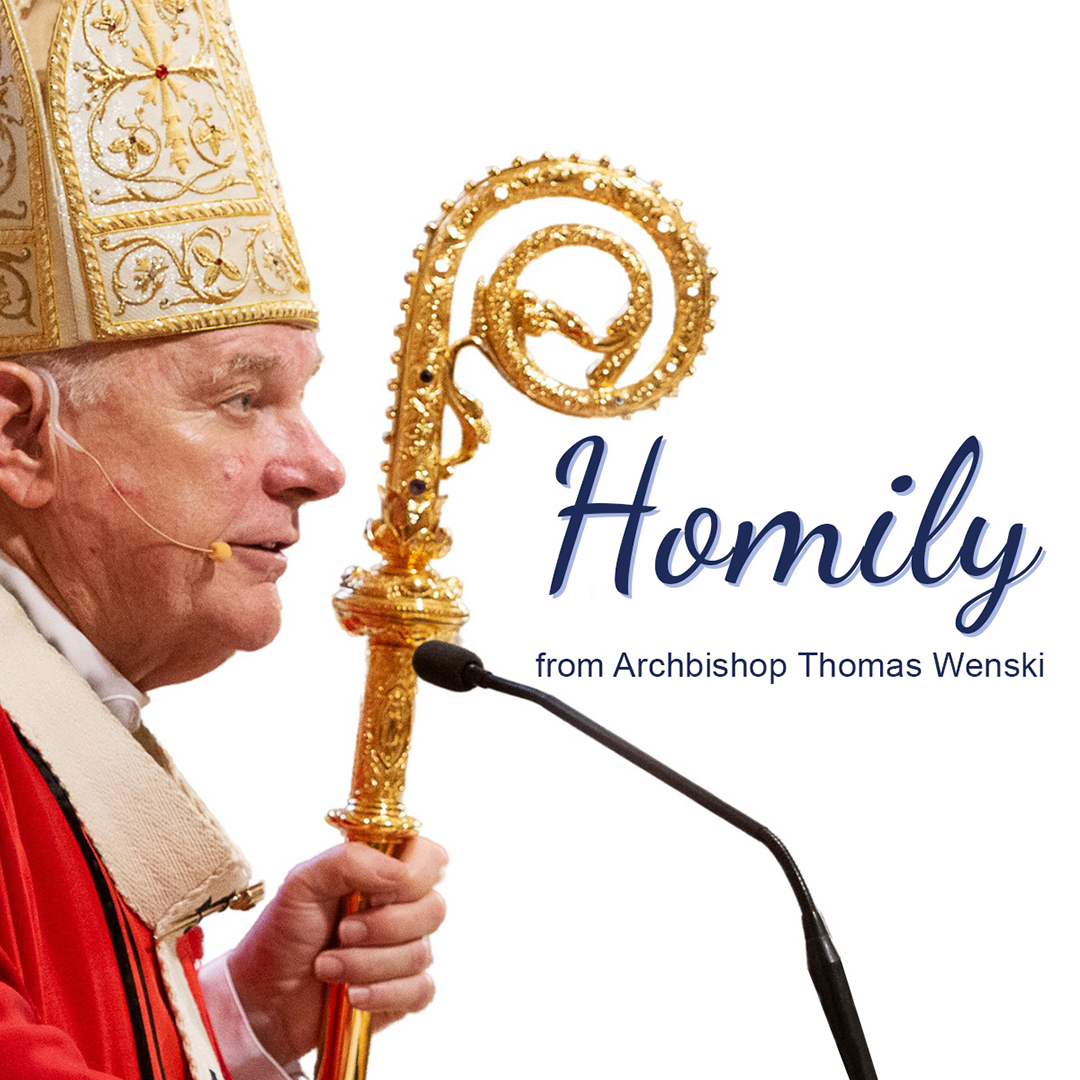By Archbishop Thomas Wenski - The Archdiocese of Miami

Photographer: TOM TRACY | FC
Archbishop Thomas Wenski poses with the four men he ordained May 11, 2024, at St. Mary Cathedral along with the bishops and seminary rectors who took part in the ceremony; from left: Father Alfredo Hernandez, rector of St. Vincent de Paul Regional Seminary; Father Emanuele De Nigris, rector of Redemptoris Mater Archdiocesan Missionary Seminary, Miami; Auxiliary Bishop Enrique Delgado; Bishop Silvio Baez, auxiliary of Managua, Nicaragua; Father Milton Martínez, Father John Buonocore, Archbishop Wenski, Father David Zallocco, Father Piotr Sawicki, Bishop Fernando Isern, emeritus of Pueblo, Colorado; Father Matthew Gomez, archdiocesan vocations director, and Father Christopher Marino, rector of St. Mary Cathedral.
Archbishop Thomas Wenski preached this homily at the ordination of four men as priests for the Archdiocese of Miami, celebrated May 11, 2024, at St. Mary Cathedral.
When your names were called, you responded “Present.” Like Isaiah who heard the Lord’s voice asking, “Whom shall I send? Who will go for us?” You answered, “Here am I, send me.” Just as Jesus was sent by the Father and he in turn sent the Apostles into the world, the four of you, by your ordination to the sacred priesthood, are sent to preach the Gospel, to sustain God’s people, and to celebrate the liturgy, above all, the Lord’s sacrifice.
I — and indeed, the entire Church of Miami — thank you for saying “yes” to the call. We all also are grateful for all those who have helped you to discern the call and to respond to it generously — your parents and your family and friends, the priests who have encouraged you, our diocesan vocation director, and the seminary rectors, faculty and administration charged with your formation.
In the Second Eucharistic Prayer, just after the consecration, the priest celebrant prays: “We offer you, Lord, the Bread of Life and the chalice of salvation, giving thanks that you have held us worthy to be in your presence and minister to you.” These words, taken from an Old Testament text, describe the essence of our priestly ministry: We are to stand in the Lord’s presence, and we are to serve him.
As priests, the Eucharist — which you are to celebrate daily — is the center of our priestly life. Through your words, especially the words of consecration, you invite Jesus into the assembly of prayer. Daily, you are called to be in His presence. Certainly, liturgy is the central duty of a priest — and this means that prayer must be a primary reality in your life so that your celebration of Mass or the sacraments reflects your own interior participation.
Your whole life, then, must be lived in the presence of the Lord. You must look to him and be there for him. You must live with your gaze on him so as to keep the world open to God.
You stand with the Lord; but you also stand for him — for it is not our word or ourselves that we preach but Christ’s word, Christ’s person.
Jesus prayed in the Garden of Gethsemane: “Father, not my will but your will be done.” You promise obedience to your bishop. In a real way, this promise gives you the freedom to be truly a man for others; this promise allows you to enter into God’s will, into God’s plan, and witness that what you believe, teach, or speak you do so in communion with the entire Catholic and apostolic Church.
The priestly ministry is not about you — it’s about Jesus Christ. So, when you preach, don’t tell us about your vacations, the movies you watched, or even about your personal struggles or failures — TMI; rather tells us of Jesus, his love, his compassion, his mercy. And be Jesus for your people!
In celebrating the Mass and the sacraments, you do what Jesus did — or better said, you allow Jesus to continue doing his saving work through you. When you baptize, you will bring men and women into a new birth; in the sacrament of penance, you will forgive sins in the name of Christ and the Church; with holy oil, you will relieve and console the sick. You will celebrate the liturgy and offer thanks and praise to God throughout the day not only for the people of God but for the whole world. In this, you fulfill a ministry both to God and to humanity in obedience to the Lord’s command: Do this in memory of me.
Seek, then, always to be conscious of what you do so that you always strive to imitate the sacred mysteries you celebrate. No one wants you to burn out — a candle that burns out leaves a sooty mess. A burned-out priest is a mess too. But you are expected to work hard: you are supposed not to burn yourselves out but to burn yourself up, to consume yourself in the service of Christ and his Church.
Attend to yourself and your teaching. Maybe you won’t be the next Fulton Sheen or Robert Baron; but when you are up in the pulpit or teaching RCIA or some such class, you cannot expect to present a teaching without having first read it, prayed over it, studied it, and prepared it and perhaps even rehearsed it.
The Lord Jesus, though He was the Son of God, willed to become a servant of all. He is the High Priest of the New and Eternal Covenant who has made you “worthy to be in (his) presence and minister to (him).” At the Last Supper, when he instituted the Sacrament of Holy Orders, Jesus portrayed the whole of his high priesthood in the simple gesture of the washing of the feet.
By your generosity in giving of your time, by your ready availability to the people of God, by your accessibility to those in pain or need, by your closeness to the poor and the marginalized, may you wash the feet of the people entrusted to your care.
With the help of the Holy Spirit who strengthens us in our weakness and of Mary, Queen of the Apostles, who watches over us with a mother’s love, may you imitate the Good Shepherd who came not to be served but to serve.

